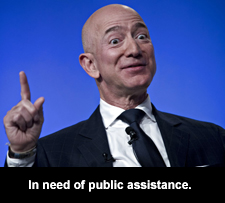The press constantly talks about how much the reconciliation plan currently under consideration in congress might cost. Of course, they know what the limit is, since the reconciliation process requires Congress to set one – it’s $3.5 trillion in spending. This is without consideration of the pay-fors, namely tax increases, savings on prescriptions drugs through national purchasing, etc.
More importantly, they characterize this high-end number as impossibly large. In fact, Meghan McCain on Meet The Press even inflated the number by $1.5 trillion, and Chuck Todd (a.k.a. Fuck Wad) didn’t seem to notice. So there’s no upper limit on exaggeration. But WTF – is $3.5 trillion really that much when you’re talking about a ten-year plan?
Lavish military spending
Look at the Defense Authorization Act the House just passed 316-113. It is $768 billion for one year. If you did the same thing with military spending as we routinely do with domestic spending, we would be talking about an 8 trillion-dollar Pentagon budget over the next ten years. That’s probably a conservative estimate, given the fact that the DOD budget increases by something like 7 to 10 percent every year.
So the obvious question for all those budget-conscious legislators questioning the price tag of the reconciliation package is this: why don’t you complain about the much more massive spending on the Pentagon? The answer is obvious. It’s the same thing Eisenhower warned us of back in 1961, as he was preparing to leave office. The military-industrial complex is alive and well.
Various flavors of Keynesianism.
Fiscal stimulus has a long track record in capitalism. Championed by British economist John Maynard Keynes back in the 1930s, the standard story goes that it fell out of favor during the Reagan era. Nothing could be further from the truth.
Reagan spent enormous amounts of money on the U.S. military. It comported with his bellicose rhetoric and policies regarding Cold War international conflicts, but there was more to it than that. Reagan’s unprecedentedly high peacetime military budgets sluiced money into high tech industries. That money made its way into virtually every congressional district in the country.
In short, it was a massive public spending program funded by debt. That model has held steady since those heady days of the 1980s, through Republican and Democratic administrations alike. Biden is no exception. During the 2020 primary campaign, I pointed out the lack of information on his web site about foreign policy. I think that was largely because there would be very little difference.
In any case, the next time someone tells you the reconciliation package is too big, remind them of our OTHER massive spending bills – the ones that blow money on tanks, planes, bombs, etc.
luv u,
jp


 This Pharaoh-like magnitude of personal wealth reflects a failing economy – more specifically, an economy that fails to serve a large swath of the population. It is about more than personal wealth. Any dude with $137 billion dollars (and there’s only one, so yes, it’s a dude) possesses $136 billion more than he could ever hope to spend on himself. The accumulation of untold billions is all about power – the power to affect the lives of millions on a whim, whether for good or ill. When Bill Gates sank a billion dollars of his fortune into distorting our educational system (and helping to undermine public sector unions in the process), he didn’t do it because we asked for his intervention. He did it because he wanted to, and because he thought his wealth gave him license. He was right … but only because we as a people have not taken steps to constrain that license.
This Pharaoh-like magnitude of personal wealth reflects a failing economy – more specifically, an economy that fails to serve a large swath of the population. It is about more than personal wealth. Any dude with $137 billion dollars (and there’s only one, so yes, it’s a dude) possesses $136 billion more than he could ever hope to spend on himself. The accumulation of untold billions is all about power – the power to affect the lives of millions on a whim, whether for good or ill. When Bill Gates sank a billion dollars of his fortune into distorting our educational system (and helping to undermine public sector unions in the process), he didn’t do it because we asked for his intervention. He did it because he wanted to, and because he thought his wealth gave him license. He was right … but only because we as a people have not taken steps to constrain that license. My life isn’t exactly typical, but my family experience offers some insight into the depth of white privilege. My dad came back from World War II, got his high school equivalency diploma, and went to work. He was white, so it wasn’t that challenging to find a job in those days. He had V.A. and F.H.A. loans, barred to black families, with which to purchase his first, second, third house and so on. By the late sixties / early seventies, we were living in a new house in the richest town in our county, with one son on the way to Oberlin College, all on one salary. Dad’s financial profile more or less tracked the trajectory of the American white working class, declining somewhat through the seventies, eighties, and nineties, but he left enough to fund an IRA and, with Social Security, set my mom up for the rest of her life. Black families, by and large, didn’t have any of that – not the jobs, not the equity, not the access to credit, an not the freedom to live wherever they wanted.
My life isn’t exactly typical, but my family experience offers some insight into the depth of white privilege. My dad came back from World War II, got his high school equivalency diploma, and went to work. He was white, so it wasn’t that challenging to find a job in those days. He had V.A. and F.H.A. loans, barred to black families, with which to purchase his first, second, third house and so on. By the late sixties / early seventies, we were living in a new house in the richest town in our county, with one son on the way to Oberlin College, all on one salary. Dad’s financial profile more or less tracked the trajectory of the American white working class, declining somewhat through the seventies, eighties, and nineties, but he left enough to fund an IRA and, with Social Security, set my mom up for the rest of her life. Black families, by and large, didn’t have any of that – not the jobs, not the equity, not the access to credit, an not the freedom to live wherever they wanted. The irony, of course, is astounding. When it faced crisis in the early 1950s, Germany’s creditors – including Greece –
The irony, of course, is astounding. When it faced crisis in the early 1950s, Germany’s creditors – including Greece –  Well, as you can see, the bottom is falling out of Big Green, economically speaking. Nothing new, right? As a class, musicians tend to be monetarily challenged, let’s say. Doing music for a living is tantamount to perpetual unemployment, interrupted by occasional contract work. And when you’re a plainclothes band, the gig money sucks. Usually you get a percentage of the door. If you’re more well known, they might give you the WHOLE door. And if you draw a good crowd, they might even throw in a window as well.
Well, as you can see, the bottom is falling out of Big Green, economically speaking. Nothing new, right? As a class, musicians tend to be monetarily challenged, let’s say. Doing music for a living is tantamount to perpetual unemployment, interrupted by occasional contract work. And when you’re a plainclothes band, the gig money sucks. Usually you get a percentage of the door. If you’re more well known, they might give you the WHOLE door. And if you draw a good crowd, they might even throw in a window as well.
 This is, however, an issue that isn’t going to be solved through police reform. Yes, dialing back police tactics is a necessary component, but it is just one element in a far more complex picture. Black Americans have been treated like shit since emancipation (prior to that as well, of course). Black life has been criminalized nine ways from Friday, starting with the virtual enslavement of African Americans in the post-reconstruction era (as chronicled by Douglas Blackmon in
This is, however, an issue that isn’t going to be solved through police reform. Yes, dialing back police tactics is a necessary component, but it is just one element in a far more complex picture. Black Americans have been treated like shit since emancipation (prior to that as well, of course). Black life has been criminalized nine ways from Friday, starting with the virtual enslavement of African Americans in the post-reconstruction era (as chronicled by Douglas Blackmon in  Really? Just a little bit of context might be nice. What was Kerry doing there in the 1960s again? Vacationing? No. Oh, that’s right – he was part of a massive invasion force that was grinding Vietnam – particularly southern Vietnam – to a bloody pulp, leaving probably 2 million dead and three countries destroyed; a massive crime that we have never been held accountable for. I think it’s a little premature to lecture Hanoi on human rights, frankly.
Really? Just a little bit of context might be nice. What was Kerry doing there in the 1960s again? Vacationing? No. Oh, that’s right – he was part of a massive invasion force that was grinding Vietnam – particularly southern Vietnam – to a bloody pulp, leaving probably 2 million dead and three countries destroyed; a massive crime that we have never been held accountable for. I think it’s a little premature to lecture Hanoi on human rights, frankly.